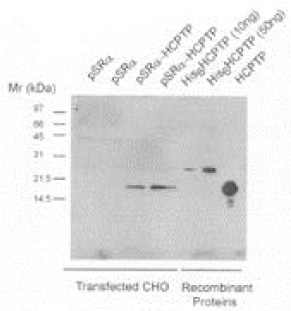Acid Phosphatase (ACP1) Sheep Polyclonal Antibody
Specifications
| Product Data | |
| Applications | IP, WB |
| Recommended Dilution | Western Blot. Immunoprecipitation: 1-10 µg/ml. |
| Reactivities | Bovine, Human, Mouse, Rat |
| Host | Sheep |
| Isotype | IgG |
| Clonality | Polyclonal |
| Immunogen | The Human protein, HCPTPA was subcloned into pRSET to express a His6 N-terminal fusion protein. This protein was expressed in E. coli and purified to homogeneity on Ni affinity matrix. |
| Specificity | This antibody reacts to LMW Protein Tyrosine Phosphatase. |
| Formulation | PBS State: Purified State: Liquid purified Ig fraction Preservative: 0.08% Sodium Azide |
| Concentration | lot specific |
| Purification | Ammonium Sulfate Precipitation |
| Storage | Upon receipt, store undiluted (in aliquots) at -20°C. Avoid repeated freezing and thawing. |
| Stability | Shelf life: one year from despatch. |
| Database Link | |
| Background | Low molecular weight protein tyrosine phosphtases, including the human red cell phosphatase, HCPTP, are widely expressed cytosolic proteins of approximately 18kDa that exist in distinct isoforms and are highly selective for phosphotyrosine over phosphoserine or phosphotyrosine. The HCPTP-A and HCPTP-B proteins expressed in human red cells and placenta are fast and slow forms of red cell acid phosphatase5. Like other tyrosine phosphatases, HCPTP is sensitive to inhibition by vanadate, and has a catalytic mechanism that involves formation of a cystinylphosphate intermediate6. The crystal structure of the bovine heart derived enzyme BHPTP shows a four-stranded central parallel b sheet with flanking a helices and an active site cysteine residue in the typical tyrosine phosphatase sequence context, CXXXXXR. Biological actions and cellular substrates have not been fully elucidated. It is expressed in a wide range of cell types, and structural homologues are expressed in yeast. A catalytically inactive LMW-PTP functions to promote cell division and binds to tyrosine-phosphorylated PDGF receptors1. The HCPTPA isoform interacts with receptor tyrosine kinases, EphB1 and VEGFR2 (flk-1) 2,4. Its overexpression inhibits VEGF-induced endothelial proliferation and migration, and its recruitment to EphB1 complexes is crucial to downstream signaling between EphB1 and integrins that mediate cell-matrix attachment3. |
| Synonyms | Adipocyte acid phosphatase, Red cell acid phosphatase 1, HAAP |
| Reference Data | |
Documents
| Product Manuals |
| FAQs |
{0} Product Review(s)
0 Product Review(s)
Submit review
Be the first one to submit a review
Product Citations
*Delivery time may vary from web posted schedule. Occasional delays may occur due to unforeseen
complexities in the preparation of your product. International customers may expect an additional 1-2 weeks
in shipping.






























































































































































































































































 Germany
Germany
 Japan
Japan
 United Kingdom
United Kingdom
 China
China



